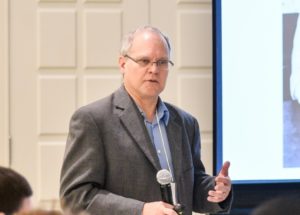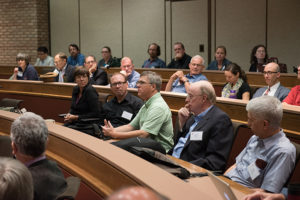A nonprofit spurs conversations about science and Christianity at conventions, churches, and campuses.

Ted Davis
Much of what Ted Davis does as Fellow of the History of Science for the BioLogos Foundation might be described as taking the work of the ivory tower down to the ground floor.
“I’m interested in bringing the best scholarship on science and Christianity out of the academy and onto the street,” says Davis, a professor of the history of science at Messiah College. Davis writes a biweekly online column for BioLogos about the role religious belief has played in shaping key developments in the history of science. In one column, for example, he explores the evolution of Darwin’s thought on God, faith, and science.
Making high-quality resources of this sort available to non-academic audiences was the inspiration behind BioLogos. The organization, launched in 2007, began as a place to discuss common reader questions about the book The Language of God by Francis Collins, leader of the Human Genome Project. The site hosts a wide range of blog posts, articles, and videos which explore issues at the intersection of science and the Christian faith. Over past decade, the BioLogos website has grown to become one of the most visited resources for information about Christianity and science.
“The prevailing story in our culture is that science and religion cannot be reconciled,” says Kathryn Applegate, a program director at the Michigan-based nonprofit. “From the beginning, BioLogos has been a place to push back against that narrative.”
In the summer of 2016, BioLogos further expanded its range of activities by launching a speakers program: BioLogos Voices. Funded by a $1.7 million grant from the John Templeton Foundation, Voices brings together 24 experts, including Davis, in fields such as biology, physics, history, and theology, to lecture at academic and non-academic venues around the country. Those interested in hosting a Voices lecture can submit a request online for one of the program’s speakers. The grant will also fund two conferences, featuring Voices speakers, through May 2019 for students, teachers, pastors, and scholars. The goal is to equip leaders to bring critical conversations about science and faith to new audiences. The grant also provides opportunities for BioLogos staff, such as Applegate, to represent the organization at major annual conventions, such as the Evangelical Theological Society’s annual meeting.
Bringing Science and Religion Together (Again)

Evolution and Christian Faith conference
Davis began lecturing as part of the Voices program last summer. In his writing and speaking, he highlights that fact that there were historical instances of significant, positive interaction between theological and scientific ideas.
“Today, people who don’t know very much about the history of science and religion take bad ideas and information and twist it into a false narrative. That’s what I’m trying to fix,” says Davis.
A signature example of these misleading narratives concerns the life and beliefs of Charles Darwin. Darwin was a creationist and a Christian when he departed on his famous voyage to the Galapagos Islands in 1831; many argue he remained so even when he published On the Origin of Species in 1859. While Darwin’s evolutionary theory argues against miraculous creation on an individual level, Davis and others reason that it supports the view that creation emerges through natural laws chosen by the creator.
Davis and other Voices speakers aim to foster a more nuanced, and accurate, understanding of science and theology by speaking directly to evangelical thought leaders, pastors, and Christian scholars, as well as to scientists and skeptics. In the few events so far where Voices speakers have lectured, the response has been positive, Applegate says.
“By speaking at churches, Christian colleges, and conferences, speakers can personally engage their audiences,” says Applegate. “We believe it inspires confidence that one can uphold the Bible as the inspired word of God and also affirm that science is valuable and provides us with an empirically justified picture of the world.”